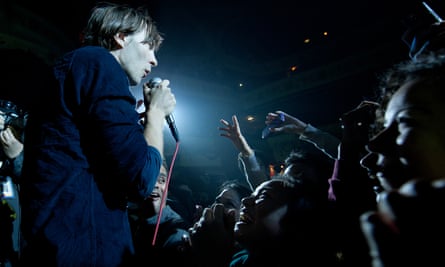1. St Germain – Sentimental Mood
In the early 1990s, French music was something of a joke; an easy punchline for British exchange students who were otherwise intimidated by the sophistication of their hosts. St Germain (AKA Ludovic Navarre, whose first new album in 15 years came out in October) was the first sign that things were changing. His 1995 album Boulevard was a massive hit with British journalists and public alike, named album of the year in the dance music magazine Muzik and paving the way for the new generation of producers whose music would later be banded together as the French touch.
St Germain’s music had little to do with the frantic, filtered disco loops that would later typify French dance music in the 90s. Instead, it took hip-hop, reggae and jazz and gently caressed them into the deep house mould, achieving the nigh-on impossible task of making 10-minute saxophone solos sound like fun. Sentimental Mood, from Boulevard, is the perfect example of his sorcery. The song uses little more than jazzy piano chords, shuffling house drums and a saxophone over its 10-minute length, which sounds like a recipe for wretched boredom. And yet Sentimental Mood has just enough tension to keep you on the edge of your seat, the disparate elements playing off each other, subtly shifting and mutating in a way that makes the addition of a second piano chord seem almost as exciting as a Keith Moon drum fill.
2. Motorbass – Ezio
Motorbass, the Parisian duo of Phillippe Zdar and Étienne de Crécy, were key players in the French touch, both together and individually. Zdar would go on to form Cassius, whose self-titled 1999 album is a French touch perennial, while De Crécy would produce the stunning Super Discount project. Motorbass’s lone studio album, Pansoul, arguably remains the highlight of their recording careers, though. Released in 1996, three years after the duo’s debut, Transphunk EP, Pansoul provided the second sign, after St Germain, that something was afoot in the French house underground.
The 10 tracks within are recognisably house music, with a touch of the deepest Detroit techno. But there is something uniquely European about them. They are full of the freedom to experiment that being outside the US and UK dance scenes seemed to allow. Ezio, for example, features the sound of a harp at its most dreamy – hardly the kind of instrument you can imagine Kevin Saunderson fiddling with over in Detroit – which dissolves into an unsettling, feverish chord sequence at the 3m40s mark. The effect is like listening to house music with a strong dose of flu.
3. I:Cube – Disco Cubizm (Daft Punk remix)
Daft Punk’s influence towers over the French touch. The duo’s early records were instrumental in attracting attention to the scene, they pioneered the filter disco sound that the French touch would make its own, and they gave a leg up to countless young French producers by letting them remix their work (as seen on the Daft Club remix album). Individually, too, Thomas Bangalter and Guy-Manuel de Homem-Christo, were vitally important to the French touch. Bangalter ran the peerless Roulé label, which released his own solo work as well as music by Alan Braxe and DJ Falcon, not to mention Stardust’s Music Sounds Better With You, while De Homem-Christo had his Crydamoure label, which made filter disco its own.
In 1996, though, Daft Punk were just a couple of young producers with a burgeoning reputation for their innovative house sound. So was Nicolas Chaix, AKA I:Cube, so it made sense for him to call them in to remix his second 12in single, Disco Cubizm. The original is a twitchy, unusual piece of jazzy house, very worthwhile in its own right. But the Daft Punk remix is something else, distilling the original elements into a tune that, while little changed, is 100 times fiercer and more direct than the I:Cube original, all nagging key runs and sweet filter release. It can still slay a dance floor today.
4. Cheek – Venus (Sunshine People) (DJ Gregory remix)
DJ Sven Hansen-Løve, one of the key DJs of the French touch era and co-writer of French Touch film Eden, recently called the DJ Gregory remix of Cheek’s Venus “the quintessential French touch track”. You can see why: Gregory’s remix, which bears little resemblance to the Cheek original, takes a few loops from Brass Construction’s Happy People and makes merry mayhem with them, filtering, tweaking and adding a thudding bass drum, resulting in a song that could put a smile on the face of an angry Doberman. It is one of those tracks, dumb as a bag of rocks yet joyous in its effect, that could double its five-minute running time without outstaying its welcome.
It also unites several of the key players in the French touch. The original song was produced by DJ Gilb’R, an important – if underrated – DJ and producer. It was released on his Versatile Records, one of the key labels of the French touch era, and it was also remixed by I:Cube and Pepe Bradock, the latter a producer whose beautifully odd take on house has earned him a rabid cult fan base. DJ Gregory, meanwhile, would go on to make his name with the Africanism project and tracks such as Block Party, which brought a distinctly tropical taste to French house.
5. Fantom – Faithful
When people talk about the French touch sound they’re usually thinking of songs like Faithfull by Fantom, a one-off pseudonym of Parisian producer and DJ Gregory collaborator Julien Jabre. As with Venus, there’s very little to Faithfull: a sample from T-Connection’s At Midnight, a phasing effect, an angry bass drum, chattering hi-hats and train sounds taken from Telex’s Moskow Diskow. It could easily be boring. But so elegant is the result, so lush and nonchalantly funky, that it draws you in like the snake in The Jungle Book. Faithfull also earns French touch bonus points by being included on both Daft Punk’s 1997 Essential Mix and Paris Is Sleeping, Respect Is Burning, a key compilation of Paris house music from 1998, inspired by the Respect Is Burning club night.
6. Phoenix – Heatwave
In 2015, Phoenix are one of the biggest mainstream rock bands around, their yacht-rock-inspired guitar pop taking them to headline slots at the Pitchfork festival and the US top 10. In 1999, though, they were part of the French touch. There was the Daft Punk connection for a start, with Phoenix guitarist Laurent Brancowitz having played alongside Bangalter and De Homem-Christo in their pre-Daft Punk band Darlin’. And Phoenix also recorded for Source, a label indelibly linked to the French touch thanks to releases by Air and Étienne de Crécy and its Source Lab compilations. But the most obvious reason for the French touch tag was the sound of Heatwave, the band’s second single. It takes the French touch’s obsession with disco samples to its logical conclusion by being a full-on disco song: four minutes of chicken-scratch guitar, tight-trousered bass and metronomic drums, all driven by gorgeous, wistful chord changes straight out of the Air song book. It is a genuinely beautiful song. But if you recognise Heatwave today, it is most probably as the basis for DB Boulevard’s 2002 song Point of View, the Italian dance act having stuck a vocal on the top of their rerecording of Heatwave on their way to scoring a global hit.

7. Pete Heller – Big Love
The success of the French touch propelled the sound overseas, where producers tried their hand at replicating its Parisian swing with decidedly mixed results. Brighton house duo Phats and Small sucked any life out of the genre with their excruciating Stardust parody Turn Around, while Armand van Helden’s You Don’t Know Me was a brilliant exercise in adding soulful vocals to French disco frug.
Best of all was Big Love by the British producer Pete Heller, a nigh-on perfect slice of filter disco that wouldn’t have sounded out of place on Roulé. Its brilliance was amazingly casual too: Big Love was apparently made in 12 hours while Heller’s usual production partner Terry Farley was off watching Chelsea and, in the best possible way, it sounds like it. There’s nothing laboured about Big Love. It sounds effortless, something it shares with many of the best French touch tunes. And while Heller may hail from Brighton, Big Love was a big hit in Paris. So it almost counts as French.
8. Jess and Crabbe – The Big Booya
Hip-hop and R&B were often cited as influences by French touch producers, and there was a certain amount of crossover between the two scenes. The Cassius duo of Philippe Zdar and Boom Bass first worked together on production for the French hip-hop artist MC Solaar, while St Germain’s Boulevard featured hip-hop beats on tracks such as Street Scene and Forget It. The Big Booya, the second single from French touch latecomers Jess and Crabbe, makes this crossover explicit. The song is propelled by a foulmouthed sample from the Notorious BIG, which meets a brilliantly rubbery bassline and surging disco strings.
The result may have little in common with the deep jazz of St Germain’s Sentimental Mood but it is an excellent example of the second, tougher wave of French touch productions that emerged at the end of the 90s, along with the likes of the Buffalo Bunch and Archigram, who notably sampled the Stooges’ I Wanna Be Your Dog on Doggystyle. The Big Booya is an incredibly simple track, the collision of three great ideas, but it has proved to have a surprisingly long shelf life. It was first released in 1999; Fatboy Slim’s Southern Fried Records rereleased it in 2003, complete with remixes from the man himself; and London label Hot Haus Records (home to DJ Haus) rereleased it again in 2013 with remixes from young producers Kodiak and Matrixxman.
9. Alan Braxe and Fred Falke – Intro
Perfection may be a myth but Intro, the debut single by Alan Braxe and Fred Falke, gets pretty close. It’s not just a brilliant, life-affirming earworm of a song, it is one that would be hard to improve on in any way. As with many of the tracks on this list, Intro is a minimal beast, using only drums, bass and a sample purloined from the Jets’ Crush on You. But could there be a better sample in house music than the Beach Boys-esque harmonies that introduce Crush on You and lend that vital element of melancholic euphoria to Intro? Could the bassline be any more perfectly elastic? And could the drums possibly sparkle with any more sly machine funk? It’s little surprise that there have been so few remixes of Intro: what on earth would you do to improve it? Braxe, incidentally, has considerable French touch history. His first 12in, the Vertigo EP, was released on Roulé records, and Braxe would later become one third of Stardust, alongside Bangalter and Benjamin Diamond.
10. Daft Punk – Human After All / Together / One More Time (reprise) / Music Sounds Better With You
Daft Punk arguably brought the French touch to an end with the release of Discovery in 2001, an album whose gleaming robo funk was so far ahead of the competition that filtering disco samples suddenly seemed very old hat. There would still be the odd French touch-esque hit, including Supermen Lovers’ Starlight, but the movement’s key artists would either change their sound (Alan Braxe and Fred Falke went none-more-80s electro-house, for example) or disappear (St Germain released no new music between 2001 and 2015). When French dance music rose again in the mid 2000s, thanks to Justice et al, the sound was noticeably harder.
And yet Daft Punk still had the time to release what may be the most French touch song of all time, on the bonus disc on their live album Alive 2007. The perpetual encore of the duo’s 2006-07 tour was a medley that included the title track of their third album, Human After All, and one of their best-known singles, One More Time, as well as key French touch tracks Together and Music Sounds Better With You. Together was the debut single and calling card of the short-lived yet brilliant duo of Bangalter and DJ Falcon, who took house minimalism to new, sparkling heights on their two 12ins for Roulé. Stardust’s Music Sounds Better With You, meanwhile, is one of the best known tracks in the history of dance music, an eternal classic destined to be played at the coolest clubs and the cheesiest weddings until death do us part. It is a song that takes all of the best elements of the French touch – the nagging disco samples, the sumptuous filters, the pounding bass drum and the sheer joy inherent in house music – and refines them into a true pop classic. Stitched together with three other quintessential examples of French dance music over 10 ecstatic minutes on Alive 2007, it is a worthy tribute to the French touch, a style of dance music that rehabilitated France’s musical reputation and continues to inspire producers such as Julio Bashmore and French Fries today.







Comments (…)
Sign in or create your Guardian account to join the discussion